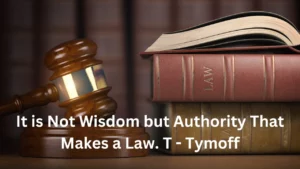Introduction:
In the realm of jurisprudence and governance, the relationship between wisdom, authority, and law has been a subject of deep contemplation. T. Tymoff’s thought-provoking statement, “It is not wisdom but authority that makes a law,” challenges traditional notions about the origins and nature of laws. This assertion raises fundamental questions about the source of legitimacy behind legal systems and the role of wisdom versus authority in shaping and enforcing laws.
Understanding T. Tymoff’s Assertion:
T. Tymoff’s statement suggests a distinction between the intellectual merit or wisdom behind a law and the authority responsible for its creation and enforcement. It implies that the mere possession of wisdom or sound reasoning doesn’t necessarily translate into the creation of laws. Instead, it highlights the pivotal role of authority figures or institutions in establishing and implementing legal frameworks within societies.
Analysis of T. Tymoff’s Perspective:
Tymoff’s assertion prompts an examination of the intricate interplay between wisdom and authority in the context of legislation. While wisdom embodies the principles of justice, fairness, and moral righteousness, authority signifies the power vested in individuals or entities to make and enforce laws. This raises questions about whether laws primarily emerge from an inherent wisdom rooted in societal values or are predominantly shaped by the authority held by lawmakers and governing bodies.

(FAQs):
1. Who is T. Tymoff, and what is the context of this statement?
T. Tymoff is a pseudonym used in philosophical discussions to represent a collective perspective rather than an individual thinker. The statement, “It is not wisdom but authority that makes a law,” underscores the idea that laws are more a product of authoritative imposition rather than stemming from inherent wisdom or moral reasoning.
2. Does Tymoff’s statement imply a disregard for the importance of wisdom in lawmaking?
Not necessarily. Tymoff’s statement doesn’t dismiss the significance of wisdom in understanding justice and moral principles. Instead, it highlights the dominant role of authority figures or institutions in establishing legal frameworks, even if they might not always align with the highest principles of wisdom or morality.
3. How does this statement impact our understanding of legal systems?
It challenges the conventional belief that laws are solely products of inherent wisdom or moral reasoning. It directs attention to the influence of authority, suggesting that legal systems can sometimes be more about power dynamics and enforcement than about moral righteousness.
Conclusion:
T. Tymoff’s assertion, “It is not wisdom but authority that makes a law,” invites us to reconsider the foundations of legal systems and the dynamics between wisdom and authority in the creation and implementation of laws. This thought-provoking statement encourages deeper reflection on the origins, legitimacy, and underlying principles that govern the legal frameworks shaping societies worldwide.
In essence, it encourages a nuanced exploration of how authority and wisdom intersect and influence the creation, interpretation, and enforcement of laws within our societies.
Disclaimer:
It’s important to note that philosophical perspectives, including those attributed to T. Tymoff, are subject to interpretation and debate, and opinions may vary regarding the implications and validity of such assertions in the realm of law and governance.